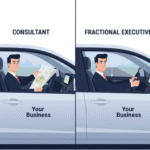In today’s fast-paced business environment, innovation is the cornerstone of growth and competitiveness. For small and medium-sized enterprises (SMEs) that may not possess the full spectrum of executive expertise in-house, “fractional executives” emerge as a transformative solution. But what does this term mean, and how does it align with innovation?
Delving into Fractional Innovation: A Paradigm Shift in Business Strategy
In an era where agility and innovation are paramount, businesses often face challenges in staying abreast of the rapid changes in the market, technology, and consumer preferences. However, maintaining a full roster of high-caliber executives with expertise across various domains can be financially draining, especially for startups and mid-sized companies. Enter the concept of ‘Fractional Innovation.’
What is Fractional Innovation?
At its core, Fractional Innovation is a modern approach that integrates the specialized knowledge of top-tier executives on a need basis. Unlike the traditional model of hiring full-time C-suite executives, this practice capitalizes on part-time senior executive talents to infuse a fresh perspective and catalyze innovation.
Imagine having a reservoir of industry leaders, each an expert in their domain, ready to dive into your business’s unique challenges without the long-term financial commitments that come with full-time positions. That’s the essence of Fractional Innovation.
Who are Fractional Executives?
Fractional Executives are not just any professionals. They are:
Seasoned Veterans: With years, sometimes decades, of experience under their belts, they’ve been through the industry’s ups and downs, have faced myriad challenges, and have celebrated numerous successes.
Flexible Thinkers: Their fractional nature means they’ve likely worked with diverse companies, industries, and cultures. This gives them a breadth of perspective, making them adept at out-of-the-box thinking.
Project-specific Assets: They’re brought in for specific tasks, challenges, or projects. Their objective is clear and focused on delivering results within that framework.
Cost-effective Leaders: Without the overheads of full-time roles—like benefits, long-term salaries, etc.—they offer a cost-effective solution for companies to tap into top-tier talent.
Bridging the Expertise Gap
One of the most salient features of Fractional Executives is their ability to fill knowledge and experience voids. For instance, a tech startup with a fantastic product might lack the marketing expertise to bring it to a wider audience. A fractional CMO could step in, steer a marketing strategy, and then step back once the company is on the right track.
In essence, these professionals provide specialized knowledge exactly when and where it’s needed most, especially in the complex realm of innovation where fresh perspectives, varied experiences, and a deep understanding of market trends can make all the difference.

How it Works
The Unique Value Proposition of Fractional Executives
Fractional executives have worked across various industries and projects and bring extensive experience and knowledge. Their diversity of exposure means they are often on the pulse of industry trends, best practices, and emerging technologies. Their primary value lies in their ability to identify potential avenues for innovation within an organization by leveraging their accumulated insights.
Development Phase: Ideation and Conceptualization
In the initial stages of innovation, ideation is paramount. With their wide-ranging experience, Fractional executives can brainstorm and develop fresh, market-relevant ideas. Their capability to evaluate a concept’s viability, feasibility, and potential ROI ensures that companies don’t chase unproductive paths. They steer the ideation process to ensure alignment with market needs, setting the foundation for successful implementation.
Implementation Phase: From Concept to Reality
Converting an innovative concept into a tangible product or service requires meticulous planning and execution. Fractional executives ensure an efficient use of resources, from cost to time. Their proficiency in team management ensures that all hands are on deck and moving cohesively toward the innovation goal. More importantly, they anticipate challenges—whether it’s resistance from certain internal factions or external market barriers—and develop strategies to navigate them.
Real-world Example of a Fractional Executive Driving Innovation: Transforming a Tech Startup’s Brand Identity with a Fractional CMO
Background:
In the heart of Silicon Valley, a startup had developed an advanced AI-driven solution to simplify project management for remote teams. Despite its robust features and sleek user interface, the startup was overshadowed by the competition. The primary issue? Their branding strategy didn’t resonate with their target audience, and potential users struggled to understand the unique value proposition.
The Challenge:
The startup’s initial branding was tech-centric. It emphasized the complex algorithms and advanced coding that powered their tool. While this might resonate with a tech-savvy crowd, most potential users—managers, team leads, and businesses—found it difficult to decipher. The branding did not communicate the solution’s practical benefits, so the startup lagged in user acquisition.

Introducing the Fractional CMO:
Recognizing the need for expert intervention, the company hired a Fractional Chief Marketing Officer (FCMO) with extensive experience in the tech sector. With a track record of transforming brands to appeal to broader audiences, this CMO was poised to redesign TechNova’s image.
Strategy & Implementation:
The CMO initiated a deep dive into market research, understanding the pain points and preferences of the startup’s target audience. He recognized that potential users valued simplicity and efficiency, so he steered the branding away from technical jargon.
The brand makeover involved:
Repositioning the Product: The AI-driven solution was rebranded to emphasize a smooth workflow and team synchronization.
Revamping Visual Identity: A new logo, website design, and promotional material were created, highlighting the tool’s ease of use and its ability to streamline project management.
Crafting a New Narrative: The FCMO led a content strategy that spoke directly to managers and team leaders. The solution was positioned as the go-to solution for remote team coordination through blog posts, videos, and user testimonials.
Engaging Marketing Campaigns: Leveraging social media and targeted ads, the CMO rolled out campaigns that spotlighted real-world benefits of the tool—showing how it saved time, reduced miscommunication, and enhanced productivity.
Results:
The transformation was nothing short of dramatic. Within just three months of the rebranding initiative, website traffic surged. More importantly, user sign-ups skyrocketed. By the end of six months, their user base had tripled, and the startup was being recognized at industry events as an emerging leader in project management solutions for remote teams.
The Comparative Advantage of Using Fractional Executives: Beyond Immediate Innovation
The role of fractional executives in today’s business landscape is rapidly evolving. While their primary contribution to driving innovation is undeniable, their impact goes beyond immediate problem-solving. Here are some of the deeper strategic advantages that fractional executives bring to the table:

- Expertise On-Demand:
- Depth and Breadth of Knowledge: Fractional executives come with industry insights and best practices from diverse sectors. Businesses can tap into this rich vein of knowledge, ensuring they’re equipped with the latest strategies and approaches.
- Timely Interventions: Rather than undergoing lengthy recruitment processes or training sessions, companies can rapidly onboard fractional executives. This allows businesses to address pressing challenges or seize emerging opportunities without delay.
- Flexibility and Scalability:
- Adapting to Business Cycles: Businesses face various challenges at different growth stages. A startup might initially need guidance in product development but later require expertise in scaling operations. Fractional executives can pivot their roles accordingly, offering guidance tailored to the business’s current needs.
- Bespoke Engagement Models: Companies can engage with fractional executives on project-based assignments, monthly retainers, or even for specific quarterly objectives. This flexibility ensures that businesses aren’t overcommitting resources or underutilizing the expertise at hand.
- Cost-Effectiveness:
- Optimized Financial Outlays: Hiring a full-time executive has significant financial implications—salary, benefits, bonuses, and long-term commitments. Fractional executives, being part-time or project-specific, often represent a more economical option, especially for SMEs.
- Maximized ROI: With their focused approach and defined objectives, fractional executives ensure that every dollar spent translates into tangible outcomes, whether in innovation, growth, or overcoming specific challenges.
Conclusion
In a world where change is the only constant, the ability to innovate swiftly and effectively can set businesses apart. Fractional executives offer SMEs a competitive edge with their diverse expertise and flexible engagement models. For businesses contemplating this model, remember: It’s crucial to align goals, ensure open communication, and choose professionals with a track record that resonates with the company’s vision. With the right fractional executive on board, innovation is not just possible; it’s inevitable.
FAQs on Fractional Innovation and Fractional Executives
What’s the main difference between hiring a consultant and a fractional executive?
While consultants and fractional executives provide expert advice and direction, the main difference lies in their level of involvement. Consultants assess, advise, and provide recommendations, often from an external viewpoint. On the other hand, Fractional executives temporarily embed themselves within the organization, taking on roles with decision-making powers and responsibilities akin to full-time executives. They’re more hands-on and involved in the execution of strategies and plans.
Are fractional executives suitable for every kind of business?
Fractional executives are versatile and can add value to various businesses, from startups to established enterprises. For startups or SMEs, they offer a cost-effective way to access high-level expertise without the commitment of a full-time hire. For larger organizations, they can bring fresh perspectives or specific expertise that might be lacking in the current team. However, it’s essential for businesses to clearly define their needs and ensure alignment with the fractional executive’s expertise for a fruitful engagement.
How does the onboarding process for a fractional executive typically work?
Onboarding a fractional executive is a streamlined process. First, there’s a phase of understanding the company’s current challenges and objectives. This is followed by integrating the executive with the existing team, ensuring they have access to all necessary resources and data. Given their experience, fractional executives adapt quickly to new organizational cultures and processes. Regular check-ins, clear communication, and defined milestones ensure the engagement remains on track.
Other Content By NeoGig
The Fractional vs. Full-time CFO Debate
From Unicorn CFOs to Fractional Teams: The Future of Financial Leadership







